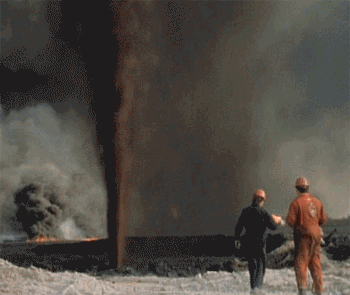
There has been much crystal gazing when it comes to the question, "When will we run out of oil?"
That's because of our rabid dependence on the black liquid...
According to the 2015 edition of the BP Plc. (NYSE ADR: BP) Energy Outlook, energy demand will increase by close to 40% over the next 20 years. And in the United States, oil accounts for 40% of total energy consumption (coal provides 23% and natural gas provides 22% of our energy), according to the U.S. Energy Information Administration (EIA).
In its report, BP estimates the world has 53.3 years of oil left at current production rates.
That's the latest projection, but such forecasts have long been tried.
In 1914, the Bureau of Mines said U.S. oil reserves would be exhausted by 1924. It was wrong. So also was the Interior Department in 1939 - it said global reserves would last only 13 years longer.
"The truth is every expert who's predicted 'the end of oil' has been wrong in the past," Money Morning Global Energy Strategist Dr. Kent Moors said on July 10, 2014. "But with global energy consumption at an all-time high, and much of the world's economy dependent on oil, the question needs to be asked: When will we run out of oil?"
Let's take a look...
When Will We Run Out of Oil?
We know with certainty oil is a diminishing commodity. It has taken millions of years to provide what we are taking out of the ground.
But a "disappearance" in oil isn't going to take place anytime even remotely soon.
"Granted, 10 years ago I might have been more sympathetic to the Chicken Little ('the sky is falling') approach when it came to the amount of crude oil remaining," Moors said. "In those days, I did say (and wrote) that we had about enough oil to possibly last one more generation."
Moors explained that what he saw as the real issue back then was not the amount of oil remaining, but the reliability of the supply.
"I foresaw unpredictable disruptions, spot shortages, and a lot of uncertainty in the market."
One factor changed all of that...
The arrival of formerly unconventional oil supplies, like tight and shale oil.
"We're now able to extract huge amounts of oil from shale formations," Moors said. "That translates into a broader availability of oil than we could have possibly foreseen a decade ago."
Indeed, the oil is seemingly almost everywhere. According to the EIA, 86% of those "new oil" reserves are located someplace in the world other than North America.
Sure, demand is still outstripping supply. And sure, there is always worldwide conflict over remaining resources.
But the problem with oil, as a resource, isn't one of decline in supply. There's plenty of oil to go around.
Instead, says Moors, the problem is one of supply constriction.
"In other words, there's enough oil, but it isn't always going to be where it's needed in a timely fashion," Moors said. "The ability to move new oil from where it's produced now (North America, primarily) to where the demand is growing quickest (developing areas, especially Asia) will be difficult in the short term."
The Bottom Line: The world isn't running out of oil - you don't have to swap your car or truck for a bicycle just yet, Moors explained.
But at any given moment, some country or region is almost certainly facing spot shortages or price spikes.
Tweet the author @TaraKateClarke, or leave a comment on Money Morning's Facebook page.
How the U.S. Will Secure Energy Freedom from Radical Middle East: The U.S. Department of Energy has confirmed the existence of a massive supply of viable free fuel - all unlocked by a startling discovery. Experts agree this free energy source could power the entire planet for at least 36,000 years. This discovery will likely decimate the Saudi royals and render OPEC obsolete. Most importantly, it's an absolute death-blow to the radical Middle East and its terrorist ties. This will have a major impact on the lives of American citizens. Click here for the full story...
Related Articles:
- USA Today: The World Has 53.3 Years of Oil Left


